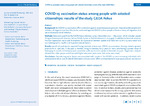COVID-19 vaccination status among people with selected citizenships: results of the study GEDA Fokus
Bug, Marleen
Blume, Miriam
Kajikhina, Katja
Bartig, Susanne
Wulkotte, Elisa
Neuhauser, Hannelore
Geerlings, Julia
Hövener, Claudia
Koschollek, Carmen
Background: the COVID-19 vaccination offers protection against severe disease progression. Data show that people with a history of migration are less likely to be vaccinated against COVID-19 than people without a history of migration, but are at increased risk of infection.
Methods: Data were used from the GEDA Fokus interview survey (November 2021 – May 2022), which included people living in Germany with Croatian, Italian, Polish, Syrian or Turkish citizenship (n=5,495). In addition to bivariate analyses, Poisson regressions were used to examine the association between uptake of at least one COVID-19 vaccination and sociodemographic, health- and migration-related factors.
Results: 90.0% of participants reported having received at least one COVID-19 vaccination. Having visited a general practitioner or specialist in the past 12 months, living in Germany for 31 years or more, and having a greater sense of belonging to society in Germany were associated with vaccination uptake in bivariate analyses. Regression analysis showed that older people and those with higher education were more likely to be vaccinated.
Conclusions: Sociodemographic factors are associated with uptake of the COVID-19 vaccine among individuals with selected citizenships. Low-threshold information and vaccination offers are important to ensure equal access to vaccination.
Dateien zu dieser Publikation

